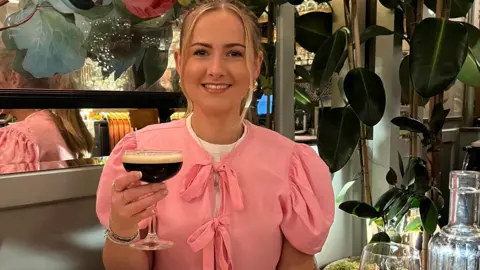My struggle to plan an accessible Christmas party
 Cerys Davage
Cerys DavageI, like so many others, look forward to the Christmas season and a party with colleagues.
However, as someone with a disability, looking for a location is not simple.
This is my first year working for Newyddion S4C in Cardiff, and everyone is looking forward to finding somewhere to celebrate together.
I have a rare form of muscular dystrophy: a condition that means weak muscles, which means I can't climb stairs very well and therefore, a location without them was required.
This is a bigger challenge than expected.
Despite calling several different locations, their answers were all similar; that they only have stairs, or that they have a lift, but one that doesn't work.
Things like a reliable lift are essential for many disabled people like me, as well as enough suitable places to sit to save energy throughout the night.
I've had several experiences on a night out where I have to leave earlier than expected because I've stood for a long time without having a chance to sit down, which leads to fatigue and muscle pain.
And this experience is not unique to me.
 Cerys Davage
Cerys Davage'People think I'm drunk'
According to Ciaran Fitzgerald, 29, the boundaries he faces on a night out "give him a lack of confidence" and separate him from his friends. He emphasises that these are not just physical boundaries, but also people's attitudes.
"I have been refused service sometimes because people think I'm drunk, but actually I've got cerebral palsy," said Ciaran.
He said this "adds a layer of awkwardness that you don't want" while out with friends.
"I just want to be like everyone else, and sometimes that's not possible because of the barriers that exist," said Ciaran, from Port Talbot.
"If institutions and establishments can take steps to adapt things in consultation with disabled people then I wouldn't be disabled in those environments, and I'd be able to enjoy myself just like my non-disabled friends."
A total of 24% of the UK population has a disability, which is more than 16m people. Official figures from 2021 showed that two-thirds of disabled people (66%) were unable to access bars, clubs, and cafes.
"Lack of accessibility is a huge problem," said Elin Williams from Disability Wales.
"Not only in terms of locations and buildings themselves but also the environments within the building, so lack of accessible toilets, flashing lights that have an impact on some people, and also a lack of rooms where people can go to have a little break if the situation is too high, and so on.
"Unfortunately, accessibility is not at the top of people's priority list, so it is not often taken into account, which means that all disabled people are left behind and feel like they don't belong, if locations are not accessible."
The charity's main message is that "a lot more work is needed to create a society that is more inclusive for disabled people."
The hope for many is that nightclub companies will listen to the needs of disabled people and change their locations to include everyone.
